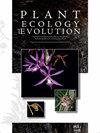南北方地区西伯利亚石松(Pinus sibirica) 30年的球果生产动态:因果解释
IF 1.3
4区 生物学
Q3 PLANT SCIENCES
引用次数: 3
摘要
背景和目的-西伯利亚石松是西伯利亚的重要物种,许多研究分析了西伯利亚石松播种动态与天气条件动态的关系。然而,所有的研究都是基于1990年之前的观察。本研究的目的是扩大我们对天气和气候因素在调节球果生产中的平衡的认识,从而得出关于西伯利亚石松当前生殖功能的结论。材料和方法-我们监测了西伯利亚平原东南部地区西伯利亚石松球果的生产,与气候因素有关,为期30年。为了分析其与气象条件的关系,我们使用了托木斯克气象站的单株成熟果数和气象数据。主要结果-在此期间,锥体产量下降了约三分之一,主要原因是完全没有高产。晚春霜冻是影响果粒产量的主要不利因素,严重霜冻的有效积温较大,导致果粒全部损失,而轻度霜冻则使果粒数量大幅减少。一个不太重要但很重要的气候因子是9月的温度:随着温度的升高,第二年的球果数量减少。在过去的30年里,最后一次春季霜冻发生的有效温度总和以及9月份的平均温度都大大增加,导致了锥体产量的减少。结论:如果目前的气候趋势保持下去,特别是如果这种趋势得到加强,那么在西西伯利亚平面上的北方森林南区的西伯利亚石松球果生产不太可能为该物种的有效更新提供支持。本文章由计算机程序翻译,如有差异,请以英文原文为准。
30-year cone production dynamics in Siberian stone pine (Pinus sibirica) in the southern boreal zone: a causal interpretation
Background and aims – Siberian stone pine is a keystone species for Siberia, and numerous studies have analyzed Siberian stone pine seeding dynamics in connection with the dynamics of weather conditions. However, all studies were based on observations before 1990. The aim of the study was to expand our knowledge about the balance of weather and climatic factors in the regulation of cone production to enable conclusions about the current reproductive function in Siberian stone pine.Material and methods – We monitored Siberian stone pine cone production in the southeastern region of the Western Siberian Plain, in association with climatic factors, over a period of 30 years. To analyze the relationship with weather conditions, we used the trait mature cone number per tree and weather data obtained from the weather station in Tomsk.Key results – During this period, cone production decreased by about one-third, mainly caused by the complete absence of high yields. The main factor negatively affecting cone production was late spring frost: severe frost occurring with a large accumulated sum of effective temperatures resulted in full cone loss, and light frost substantially reduced cone number. A less important but significant climatic factor was September temperature: as the temperature increased, the cone number decreased in the following year. Over the last 30 years, the sum of the effective temperatures at which the last spring frost occurs, as well as the average September temperature, increased considerably, resulting in reduced cone production.Conclusion – If the current climatic trend is maintained, and especially if it is strengthened, Siberian stone pine cone production in the southern boreal forest zone on the Western Siberian Plane is unlikely to provide for the effective renewal of the species.
求助全文
通过发布文献求助,成功后即可免费获取论文全文。
去求助
来源期刊

Plant Ecology and Evolution
PLANT SCIENCES-
CiteScore
2.20
自引率
9.10%
发文量
27
审稿时长
>12 weeks
期刊介绍:
Plant Ecology and Evolution is an international peer-reviewed journal devoted to ecology, phylogenetics and systematics of all ‘plant’ groups in the traditional sense (including algae, cyanobacteria, fungi, myxomycetes), also covering related fields.
The journal is published by Meise Botanic Garden and the Royal Botanical Society of Belgium.
 求助内容:
求助内容: 应助结果提醒方式:
应助结果提醒方式:


